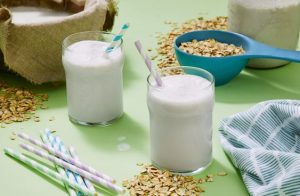Spring water, sourced from underground aquifers, is known for its crisp taste and mineral content. It’s a popular choice for drinking water, but is it safe for preparing baby formula?
Potential Benefits of Spring Water
Mineral Content:
Spring water naturally contains essential minerals like calcium and magnesium, which are important for infant development.
Taste:
Many people find spring water more palatable than tap water due to its clean taste.
Environmental Considerations:
Choosing spring water in reusable glass bottles can be a more eco-friendly option than single-use plastic bottles.
The Concerns: Mineral Content and Contamination
While spring water has its benefits, there are a few concerns to consider when using it for baby formula:
- High Mineral Content: Some spring waters contain high levels of minerals like fluoride, sodium, and sulfate, which can be harmful to infants in excessive amounts. High mineral content can also lead to digestive issues or stress on a baby’s developing kidneys.
- Contamination Risk: While most bottled spring water is treated to remove bacteria and contaminants, there’s always a slight risk of contamination from the source or during bottling. This risk is particularly concerning for newborns with immature immune systems.
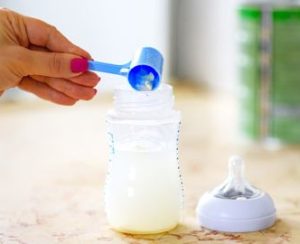
Recommendations for Spring Water Use:
- Check with Your Pediatrician: Consult your pediatrician before using spring water for formula to assess your specific brand’s mineral content and your baby’s individual needs.
- Boil Spring Water: Always boil spring water before using it for formula preparation to kill any potential bacteria. Cool the boiled water to the appropriate temperature before mixing it with formula powder.
- Use in Moderation: While occasional use of spring water for formula may be okay, it’s not recommended for daily use due to the potential for high mineral content.
- Choose Reputable Brands: Select spring water brands that have a proven track record of safety and quality testing.
Safe Alternatives to Spring Water for Formula
If you’re looking for alternatives to spring water for formula preparation, consider these options:
- Purified Water: Purified water undergoes filtration processes like reverse osmosis or distillation to remove contaminants while retaining some essential minerals. It’s a safe and convenient choice for baby formula.
- Nursery Water: Specifically formulated for infants, nursery water is purified and demineralized to provide a safe and gentle option for mixing formula.
- Distilled Water: Distilled water is the purest form of water, with all minerals and impurities removed. It’s safe for babies but may lack some essential minerals found in other water sources.
- Low-Mineral Bottled Water: Some bottled water brands offer low-mineral varieties specifically designed for infant formula preparation. Check the label for information on mineral content.
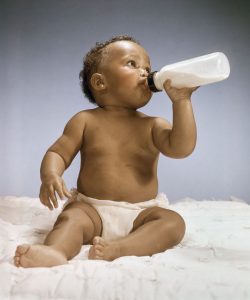
Tap Water: A Viable Option?
If your tap water is safe and meets EPA standards, it can be used for formula preparation. Boil tap water for at least one minute and let it cool before mixing it with formula powder. If you have concerns about the quality of your tap water, consult your local water authority or consider using a filtered water pitcher.
Preparing Formula Safely: Essential Steps
Regardless of the water source you choose, follow these steps to prepare baby formula safely:
- Wash Your Hands: Thoroughly wash your hands with soap and water before handling formula or bottles.
- Clean and Sterilize Bottles and Nipples: Wash bottles and nipples in hot, soapy water or use a dishwasher. Sterilize bottles and nipples before first use and periodically thereafter.
- Boil Water (if necessary): If using tap or spring water, boil it for at least one minute and let it cool to the appropriate temperature before mixing with formula powder.
- Measure and Mix: Carefully measure formula powder according to the instructions on the container. Use the scoop provided with the formula to avoid over or under-feeding your baby.
- Feed or Store: Feed your baby the prepared formula immediately or store it in the refrigerator for later use. Discard any unused formula after 24 hours.
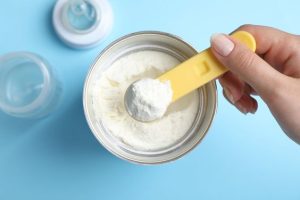
Staying Informed: Resources for Safe Formula Preparation
- Your Pediatrician: Your pediatrician is the best resource for guidance on safe formula preparation and choosing the right water source for your baby.
- World Health Organization (WHO): The WHO provides guidelines on safe water and sanitation practices for infant formula preparation.
- Formula Manufacturers: Many formula manufacturers offer information and resources on their websites regarding safe formula preparation.
By taking the time to choose the right water source and following safe formula preparation practices, you’re ensuring your baby receives the nutrition they need for healthy growth and development.
The Importance of Water Temperature
The temperature of the water used to prepare baby formula is crucial. Too hot, and it could burn your baby’s delicate mouth; too cold, and it might not dissolve the formula powder properly.
- Ideal Temperature: The ideal temperature for mixing formula is 70°C (158°F). This temperature ensures that the formula is safe for consumption while also killing any potential bacteria present in the water.
- Cooling Down: After boiling water, let it cool to a lukewarm temperature before adding formula powder. You can test the temperature on your wrist; it should feel warm but not hot.
- Avoid Microwaving: Microwaving can create hot spots in the water, increasing the risk of burns. It’s best to warm bottles using a bottle warmer or by placing the bottle in a bowl of warm water.
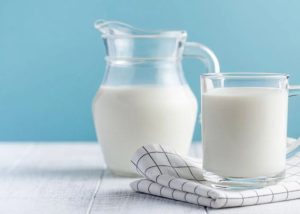
Additional Considerations for Formula Feeding
-
Formula Storage: Store unopened formula containers in a cool, dry place away from direct sunlight. Once opened, use the formula within the recommended timeframe specified on the packaging.
-
Bottle Cleaning: Clean bottles and nipples thoroughly after each use with hot, soapy water or in the dishwasher. Sterilize bottles and nipples before the first use and periodically thereafter.
-
Feeding Schedule: Consult your pediatrician for guidance on how often and how much formula to feed your baby based on their age and individual needs.
Beyond Water: Other Factors Affecting Formula Safety
- Formula Handling: Always follow safe handling practices, such as washing your hands before preparing formula and avoiding cross-contamination.
- Expiration Dates: Check the expiration dates on formula containers and discard any expired products.
- Water Source Safety: If you have concerns about the safety of your water source, consult your local water authority or consider using a filtered water pitcher.
- Proper Mixing: Follow the instructions on the formula container for proper mixing ratios. Avoid over-concentrating or diluting the formula, as this can affect your baby’s health.

